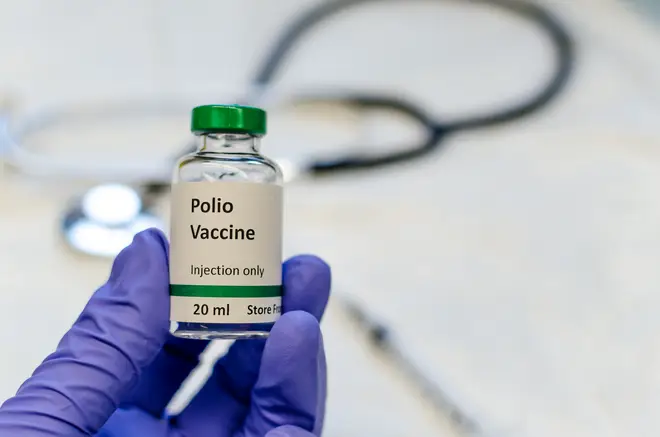
Iain Dale 10am - 1pm
10 August 2022, 12:02 | Updated: 10 August 2022, 12:24

All children aged one to nine in London will be offered a polio booster vaccine.
No polio cases have been detected in the UK and the risk remains low, Health and Social Care Secretary Steve Barclay said.
“Vaccines offer the best defence to children, and those around them, so I would encourage families to ensure they are up to date with their routine jabs, and to come forward for the polio booster as soon as they are contacted by the NHS," he said.
It comes after further traces of polio were discovered in the capital's sewage system, in Barnet, Brent, Camden, Enfield, Hackney, Haringey, Islington and Waltham Forest.
The Joint Committee on Vaccination and Immunisation (JCVI) has advised that a targeted inactivated polio vaccine (IPV) booster dose should be offered to all children between the ages of one and nine in all London boroughs.
Across London, childhood vaccination uptake is lower than the rest of the country.
The NHS will contact parents when it's their child’s turn to come forward for a booster or catch-up polio dose.
Read more: Polio virus detected in London after routine test at sewage works

'I thought we got rid of Polio?'
Mr Barclay added: “On the advice of the independent Joint Committee on Vaccination and Immunisation (JCVI), the NHS will now offer all children aged one to nine across the capital a polio vaccine booster dose, starting with the most impacted boroughs, so we can ensure they have the best possible protection and we reduce the chances of transmission.
"We know many countries, including Belgium and Portugal, offer an additional dose as part of their childhood vaccination programme, and the JCVI has considered international data on safety and effectiveness in forming their recommendation, which I have accepted."
Polio, which can cause paralysis in rare cases and become life-threatening, was officially eradicated in Britain in 2003.
But the Medicines and Healthcare products Regulatory Agency and UK Health Security Agency [UKHSA] found traces of it in samples collected from London Beckton Sewage Treatment Works in June.
The plant serves about four million people in north and east London.
The UKHSA declared a national incident following the discovery.
Read more: Raymond Briggs author of The Snowman dies aged 88 as heartbroken family pay tribute

Caller, who caught polio in 1957 at the age of five, speaks to LBC
The health agency has previously suggested a person was vaccinated abroad with a live oral polio vaccine, possibly in Afghanistan, Pakistan or Nigeria, and then came to the UK early this year, then shedded the virus.
They have now passed that on to other closely linked people in the north east of London, who have shedded it into their faeces.
Analysts are investigating whether just one family or an extended family could be affected but it is unclear how many people need to get the virus to have it show up in sewage samples.
It is normal for the virus to be picked up as isolated cases and not detected again but experts have alerted the public after a number of genetically-linked samples were uncovered between February and May.
In the past, the virus has been brought back by a person vaccinated overseas with a live oral polio vaccine who returned or visited the UK and briefly shed traces of the vaccine-like poliovirus in their faeces.
But this virus appears to have evolved and is now regarded as a "vaccine-derived poliovirus type 2", or VDPV2.
People get vaccinated at eight, 12 and 16 weeks old, and again aged three and later at 14. All are needed to be fully-vaccinated – in London, 90% of children had the correct number of doses by aged two, compared to 95% nationally.
Just 71% in the capital were fully jabbed by age five.